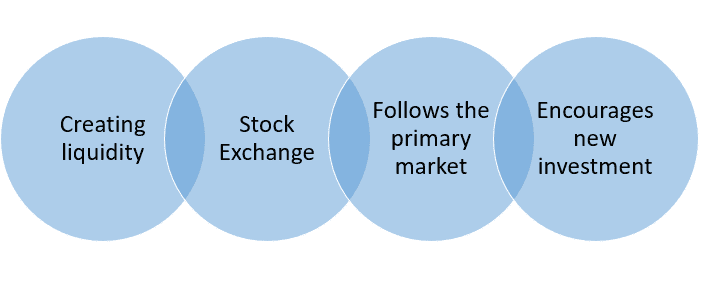What are the Primary Market and the Secondary Market? – Trading Fuel
Businesses will require short-term as well as long-term funds.
Short-term funds will be raised through the money market.
Long-term funds will be raised through the capital market.
When we look at the capital market, it comprises the following two markets:

Both the primary as well as secondary markets are very distinct terms.
Basics of the Primary Market and the Secondary Market:
The primary market is the place where securities are created.
The secondary market is the place where securities are traded among investors.
In the primary market, businesses are engulfed in selling new bonds and stocks to the entire public for the very first time. This process is also called the Initial Public Offer, or IPO.
The secondary market is simply the stock market where the securities are traded. The main secondary markets are the National Stock Exchange (NSE), Bombay Stock Exchange (BSE), NASDAQ, and New York Stock Exchange (NYSE), etc.
What is the Primary Market?
A primary market is a place where securities are sold for the very first time in order to acquire long-term capital for a business.
This market is primarily responsible for acquiring new issues.
Therefore, the primary market is also called the “New Issue Market.”
Also Read:What is Equity in Share Market?
What are the funds collected for?

How are the collected funds used?
The primary market, after collecting the funds for new and existing businesses, will use them in any of the following ways:

Features of the primary market:
The main features of the primary market are as follows:

What are the main sources for raising capital in the primary market?
There are several sources for raising capital in the primary market.
The given below are the main sources for raising capital in the primary market:
| Public Issue | The company will issue the prospectus and will invite the public to purchase its shares and debentures |
| Offer for Sale | New securities will be offered to an intermediary firm or the stockbroker at a very fixed price only to be resold to the general public |
| Private Placement | The company will sell the securities to institutional brokers or investors instead of selling them to the general public. The securities will then be sold to the selected clients at a higher price. |
| Rights Issue | This issue will be used by the company that has already issued its shares. In this case, the shareholder will hold the right to either accept the offer for himself or assign a part of his right in the favor of another person |
| E-IPOs | The securities here are issued through digital mode. The company that is issuing the securities will first enter into a contract with any of the stock exchanges for which a SEBI registered stock broker has to be appointed who will then work as the intermediary communication channel |
Also Read:What is Share Market in Simple Words?
What is the secondary market?
A secondary market is one where the securities of a company are traded among investors.
This will mean that investors can buy and sell the securities freely without any intervention from the issuing company.
For the transactions that will take place among the investors, the issuing company will not participate in the income generation of the company.
Apart from this, the share valuation is based on the performance of the shares in the market.
Main features of the secondary market:
Instead of ensuring the true and fair view of the deal for the protection of the investors’ interests.
The main features of the secondary market are as follows:

Creating liquidity:
The main feature of the secondary market is to create liquidity, which means immediate conversion of securities into cash.
The secondary market security can be sold and bought multiple times, which helps with liquidity creation.
Stock Exchange:
The securities of the secondary market are traded at a particular place, which is called the Stock Exchange.
It is not mandatory that the trading has to be done via a stock exchange only.
It can be done between the two individuals mutually, and it can be called a transaction.
Follows the primary market:
Any new security cannot be sold for the first time in the secondary market.
All the new securities are issued for the very first time in the primary market and are then sold in the secondary market.
Encourages new investment:
Because the securities in the stock market fluctuate so much, many investors come to trade and profit, resulting in new investments.
This will result in an increase in investment in the industrial sector.
Also, Know AboutBingo Trading System
Types of the secondary market:
The secondary market can be broadly categorized into two categories.
They are as follows:

Stock Exchange:
The stock exchange is the platform that will enable the trading of securities without any contact between the buyers and the sellers.
The most important examples of the stock exchange are the Bombay Stock Exchange (BSE) and the National Stock Exchange (NSE).
All the transactions that are taking place on the stock exchange will be subjected to the constricted regulations in securities trading.
A stock exchange is considered to be acting as a guarantor, and thus there is no risk of counterparty risk.
Over-the-Counter (OTC) markets:
These are the decentralized markets, which will mainly consist of the participants that are engaged in trading among themselves.
The FOREX (foreign exchange market) market is the best example of the OTC market.
For the OTC market, there is no regulatory authority involved and the parties can directly deal with each other, which leads to counterparty risk.
Main differences between the primary market and the secondary market:
We have already understood the meaning as well as the features of both the markets, so now let us understand the differences between the two:
The following are the main differences between the two:
| Basis | Primary Market | Secondary Market |
| Meaning | It is a marketplace wherein companies will float fresh issues of the securities to the general public with the aim to acquire the capital to meet their long-term fund needs | It is a setup of the capital market wherein the current shares, debentures, treasury bills, etc. of the companies are floated among the investors |
| Other Name | New Issue Market (NIM) | After Issue Market (AIM) |
| Type of purchase | Direct | Indirect |
| Finances | Will finance the existing companies for expansion and growth | Will not provide any sort of finance |
| Parties involved in trading | Between company and investors | Between the investors |
| Price levels | Fixed | Varies with the demand and supply |
| Intermediaries | Underwriters/ investment bankers | Brokers |
| Purpose | Will provide finance to the new and existing companies | Will enable the trader/ stockbrokers to earn profits by trading the securities among them |
| Treatment of the amount received | Becomes the capital of the company | Becomes the income of the investors |
| Validity of the securities | Traded only once | Traded infinite times |
Conclusion:
The primary, as well as the secondary markets, will play a vital role in the mobilization of funds for the businesses that will facilitate the economy.
Frequently Asked Questions (FAQs)
About Us:
Trading Fuel is our website for blogs where we give you information about the various sectors of the economy like finance, economics, stock markets, and intraday trading. Stay tuned, and enjoy your reading!

